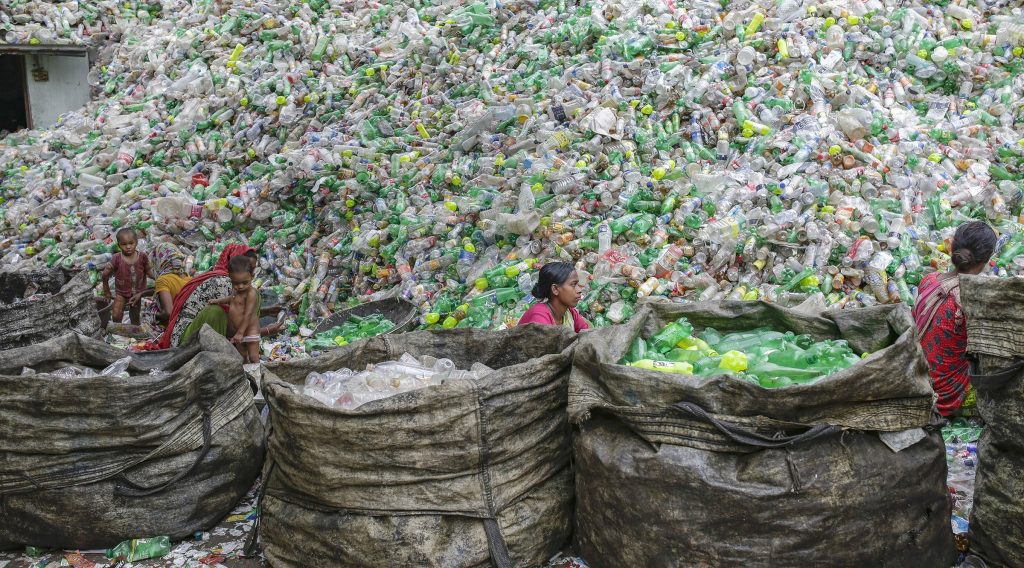
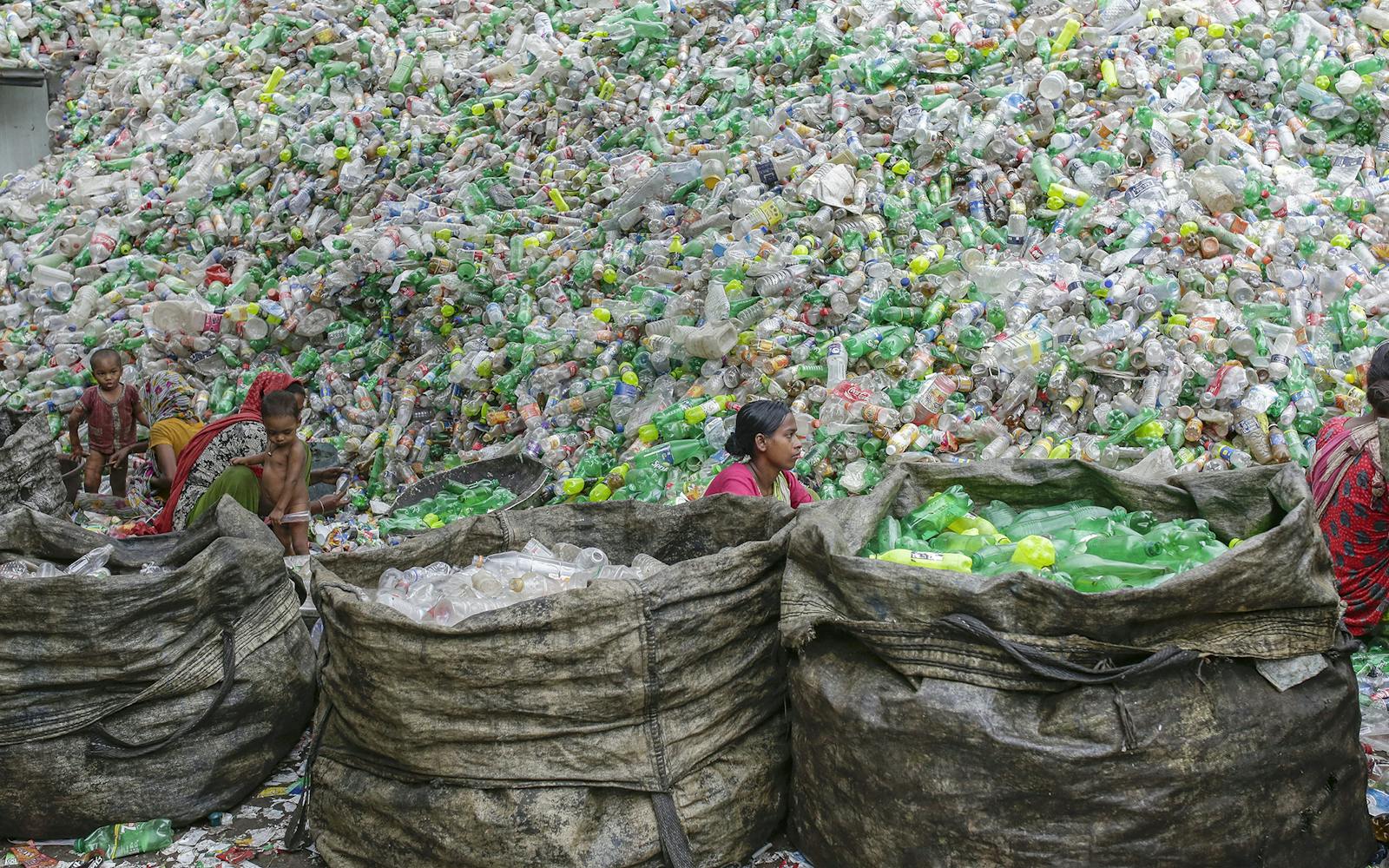
feminine staff type out plastic bottles for recycling in a manufacturing unit in Dhaka, Bangladesh. If plastic manufacturing stays on its current trajectory, by 2030, greenhouse gasoline emissions from plastic might attain 1.34 billion tons per yr. photograph: Abir Abdullah/local climate Visuals
Plastics are polluting our planet and choking our ocean, harming human well being, and damaging ecosystems very important to our livelihoods. The UN setting Programme is elevating the alarm on the severity of the worldwide plastics disaster and highlighting the networks of on an everyday basis people, coastal staff, and communities who’re spearheading options to beat plastic air pollution.
better than 430 million tons of plastic are produced yearly, two-thirds of which is forged aside as waste after simply one use.
Eleven million metric tons of plastics enter our ocean alone yearly, collectively with the estimated 200 million metric tons that already stream by way of our marine environments, per information from the Ocean Conservatory.
on the current cost of manufacturing, there might be extra plastic than fish inside the ocean by mid-century, in response to Nikola Simpson, Head of the United Nations enchancment Programme’s Barbados and japanese Caribbean Blue economic system Accelerator Lab.
“We simply preserve producing, producing, producing plastic,” she says.
The UN setting Programme is set to assist the world avert such a catastrophic future. UNEP’s new report, “Turning off the faucet: How the world can finish plastic air pollution and create a round economic system,” maps out a plan to minimize again worldwide plastic waste by eighty% inside twenty years.
listed right here are 5 the purpose why the world should beat plastic air pollution — and the means all people can step as a lot as defend our planet for generations to return.
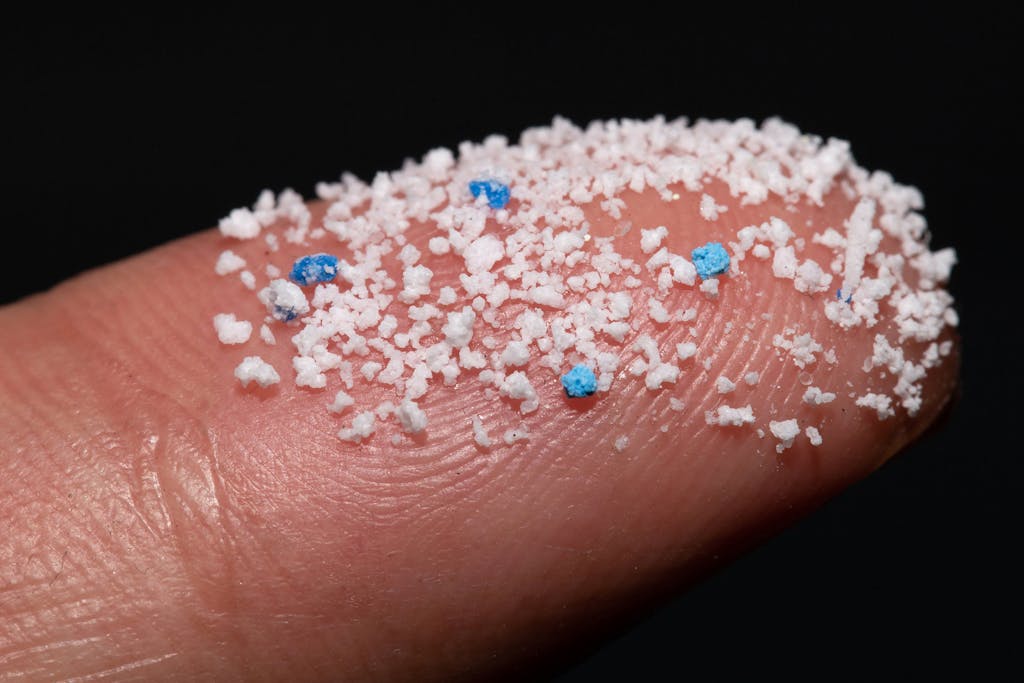
Microplastic pellets, proven right here on a fingertip, are terribly small gadgets of plastic particles found virtually all by way of the place inside the setting, ensuing from the disposal and breakdown of shopper merchandise and industrial waste. photograph: Chayanuphol
1. Plastic is all by way of the place.
From the Philippines to the Arctic to the infamous good Pacific garbage Patch, plastic is all by way of the place. It takes a quantity of varieties, from synthetic fishing nets to single-use gadgets like water bottles and trash luggage.
If all plastic waste inside the ocean have been collected, it would fill 5 million transport containers. Put one other means, there’s ample plastic inside the ocean to stretch 30,000 kilometers (18,640 miles) if positioned finish to finish. That’s the equal of a go to from NY metropolis to Sydney, Australia.
and since plastic is in no means biodegradable, it merely breaks aside into smaller and smaller gadgets over time, creating what’s typically recognized as micro- or nanoplastics.
“It’s fully indestructible,” says Agustina Besada, co-founder and CEO of Unplastify, a agency based mostly in Buenos Aires, Argentina, dedicated to ending plastic air pollution. “To me, that’s a drawback of systemic design.”
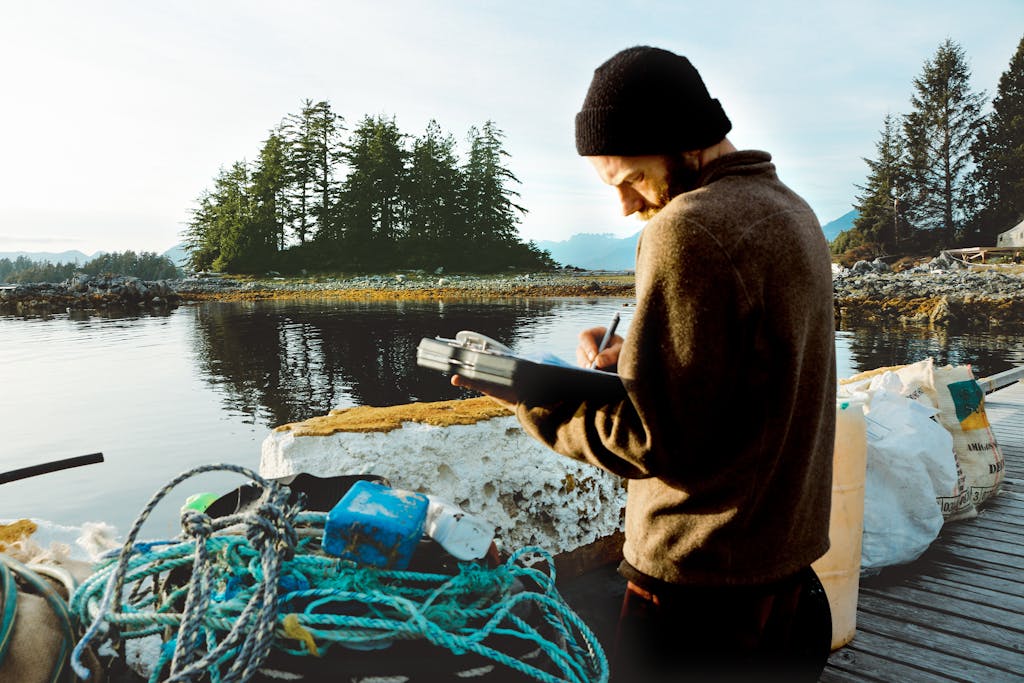
a particular person works to scrub up marine waste from the seashores and waters of Clayoquot Sound on the west coast of Vancouver Island, Canada. information from distant seaside cleans is recorded, tracked and used to create public-dealing with purposes and campaigns to create systemic change for air pollution from plastics and particles. photograph: Nicole Holman/local climate Visuals
2. Plastics damage Our well being and Our Ecosystems.
regardless of being tiny in dimension, microplastics and nanoplastics pose an enormous risk to human well being and the well being of important ecosystems.
“These microplastics act as little sponges and embrace rather tons of of diverse chemical substances that get absorbed,” Besada explains. “All these [affect] our well being system [and can cause] endocrine alterations.”
additionally they infiltrate and contaminate every an ingredient of the planet, from on an everyday basis issues like our clothes and laundry to distinctive areas simply like the summit of Mount Everest or the depths of the ocean.
When disposing of plastic, “there’s no such factor as ‘away,’ as a outcome of all the pieces should go someplace,” Simpson says. “It’s in your cellphone, in your financial institution card, in your garments. … It’s now in your blood.”
if you have a look at “the human well being impacts of plastics,” she supplies, “a quantity of of them have been linked to probably being cancerous.”
And it’s not simply people who’re being negatively impacted; ocean ecosystems are harmed as effectively. Besada notes that plastics have been proven to have an effect on copy talents in animals, which has critical implications not solely for our meals chain however additionally for communities that rely upon these ecosystems for his or her livelihoods.

A feminine pupil of Nikuao major faculty in Kiribati refills her water bottle from reusable containers sponsored by UNICEF. photograph: Vlad Sokhin / UNICEF
three. To Beat Plastic air pollution: Reuse, Recycle, Reorient.
It’s solely doable to meet UNEP’s bold aim of reducing plastic waste by eighty% inside the following twenty years. The modifications now we want to make as consumers are essential, reasonably priced, and achievable by implementing three market shifts.
Eliminating pointless frequent plastics comparable to extreme packaging is the 1st step, in response to UNEP’s “Turning off the faucet” report. Reusing refillable bottles for event, collectively with enhancing recycling and turning to greener alternate options, are amongst the numerous report’s recommendations.
“If we will minimize again manufacturing which might significantly assist. after which hopefully, as behavioral change will enhance, we then use alternate options, or we return to what we used prior to now,” says Simpson.
Besada supplies, “now we want to decide that are the plastics that we nonetheless want, and now we want to increase infrastructure to recycle. … We can not rely [solely] on recycling to restore the drawback.”
Not all plastics are made the identical both. So, figuring out what variety of supplies might be recycled — and the place — is very important. a quantity of financial, social, and cultural causes, collectively with infrastructure, are an ingredient of why recycling isn’t on an everyday basis perfect, Besada explains.
nonetheless, transitioning to plastic alternate options that are much less dangerous to the setting would assist, which the report describes as reorientation and diversification.
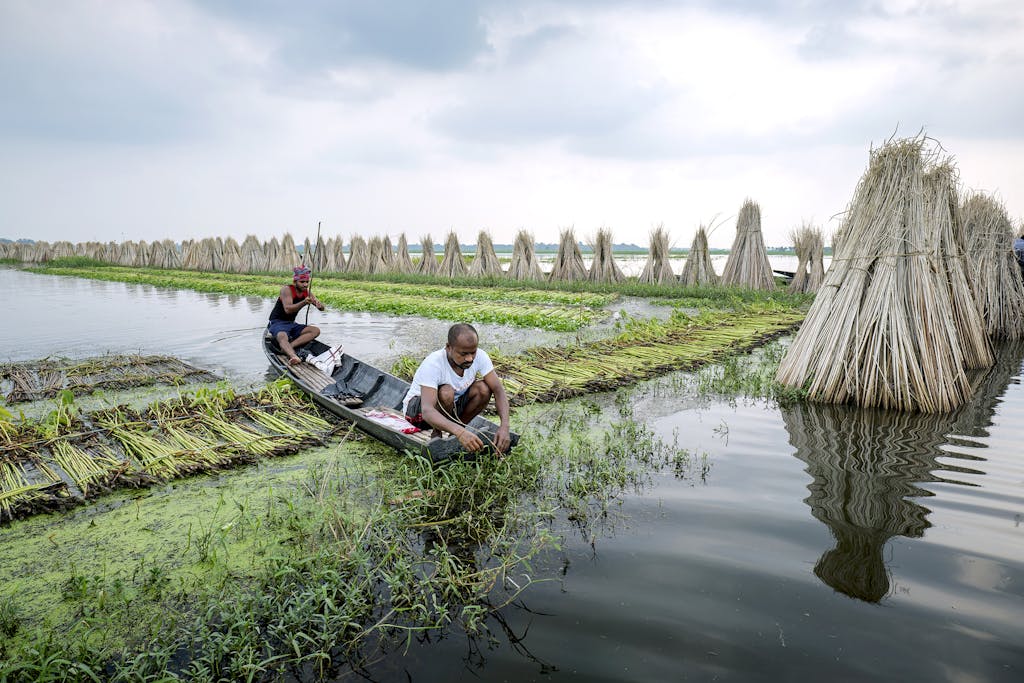
Two males harvest jute crops and stack them for drying in India. Jute, which is amongst the numerous biggest alternate options to plastic merchandise, has develop to be an more and more frequent crop to develop in West Bengal. photograph: Dipayan Bose/local climate Visuals
4. Transitioning Away from Plastics Saves money and Creates Jobs.
With an estimated annual monetary hazard of $one hundred billion for companies dealing with waste administration, circularity in plastics — or put merely, using plastics extra effectively — might save $4.5 trillion in environmental and social prices inside the following 17 years, as underscored in UNEP’s report.
The transition would additionally create tons of of 1000’s of alternatives, earnings, and innovation by 2024. That’s seven hundred,000 extra jobs and improved livelihoods for hundreds of 1000’s of staff in creating nations instantly associated to brief-lived plastics, in response to the report.
nonetheless, rather tons of of labor might be wished to handle one hundred million metric tons of plastics from brief-lived merchandise yearly by 2040. If authorities insurance coverage policies fail to assist shifting away from plastic manufacturing and overconsumption, nations might be left inside the lurch with 227 million tons of plastic administration versus forty million tons, in response to the report.
With plastic packaging virtually all by way of the place, “every particular person on common makes use of forty five kilograms, which i really feel is ninety [to a 100] kilos of plastic per yr,” says Besada.
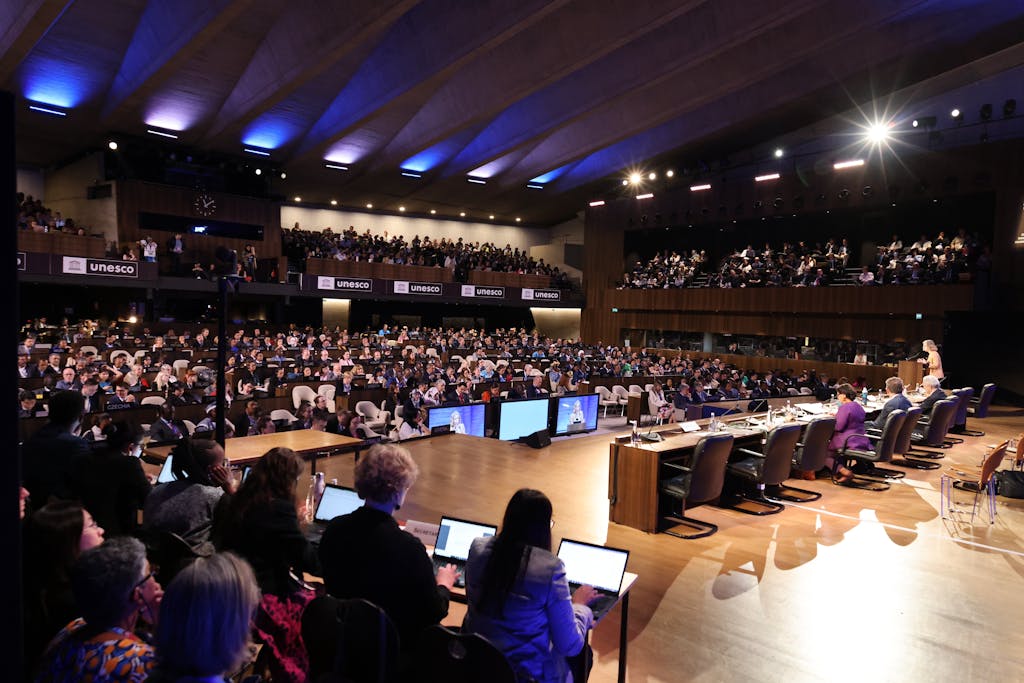
Negotiations start on the UN setting Programme’s second Intergovernmental Negotiating Committee meeting on plastic air pollution at UNESCO headquarters in Paris. photograph: Twitter / Inger Andersen.
5. worldwide Momentum to finish Plastic air pollution is rising.
March 2022 marked a historic decision on the fifth session of the United Nations setting meeting, the place all 193 UN Member States agreed to finish plastic air pollution by way of a binding authorized settlement for the prime of subsequent yr, says Simpson, who contributed to the treaty’s textual content material.
Besada notes that every voices and stakeholders must have balanced illustration and work in the direction of bipartisanship all by way of the negotiating course of, which is ongoing. The second session of the Intergovernmental Negotiating Committee simply came about in Paris.
collectively with authorities movement, UNEP highlights the significance of efforts to increase advocacy and consciousness. people and communities should proceed to make the most of their voices to discuss regarding the should finish plastic air pollution and put their values into observe by supporting companies striving to minimize again single-use plastic merchandise of their current chains.
“I on an everyday basis try and encourage all people to try to create systemic change,” says Besada. for event, if a faculty can confederate with a bakery to cease packaging cookies with plastic and as one other promote cookies in bulk, she says, then the prospects are limitless.
anyone can take part. anyone could make a distinction regionally. anyone can take their advocacy efforts to the following stage.
“should you want to advocate and pursue regulation, do it,” Besada urges. “there are a lot of, many ranges of movement, it simply relies upon upon how involved you want to get.”
be a part of the movement
assist defend our planet and save our ocean by becoming a member of worldwide efforts to #BeatPlasticPollution this World setting Day — and daily of the yr.

